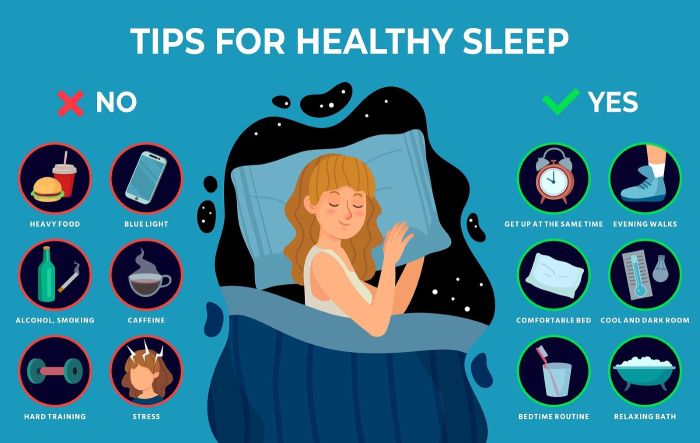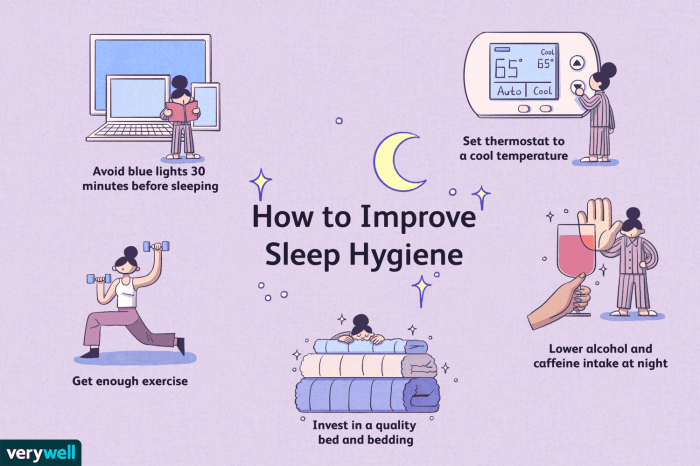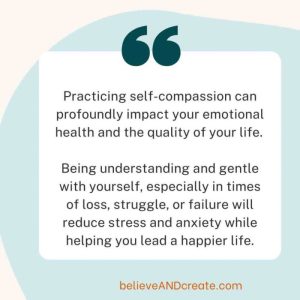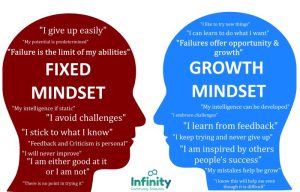How to Get Better Sleep for Mental Well-being

How to get better sleep for mental well-being is crucial for overall health. This exploration delves into the profound connection between sleep and mental wellness, examining how sleep deprivation impacts cognitive function, mood, and stress response. We’ll uncover practical strategies for improving sleep hygiene, managing stress and anxiety, and building resilience to enhance both sleep quality and mental well-being.
From creating a consistent sleep schedule and optimizing your sleep environment to exploring mindfulness techniques and seeking professional help when needed, this guide offers a holistic approach to achieving restful sleep and improved mental health.
Workplace Mental Health and its Impact on Sleep

The modern workplace presents numerous challenges that significantly impact employee mental health, directly affecting sleep quality and overall well-being. Stress, demanding workloads, long hours, and a lack of work-life balance are common culprits, leading to anxiety, depression, and ultimately, sleep disturbances. Understanding these connections is crucial for creating healthier and more productive work environments.Workplace stressors frequently manifest as difficulties falling asleep, staying asleep, or experiencing restful, restorative sleep.
This sleep deprivation, in turn, exacerbates existing mental health concerns and reduces an individual’s ability to cope with workplace pressures, creating a detrimental cycle. The impact extends beyond individual suffering, affecting productivity, workplace relationships, and the overall organizational climate.
Challenges Affecting Sleep and Mental Health in the Workplace
High-pressure work environments, characterized by demanding deadlines and intense competition, frequently contribute to chronic stress and anxiety. This can manifest as insomnia, difficulty unwinding after work, and increased reliance on sleep aids. Long working hours, including overtime and irregular shifts, disrupt the body’s natural sleep-wake cycle, leading to sleep deprivation and reduced cognitive function. Furthermore, a lack of control over one’s work, coupled with insufficient job security or perceived unfairness, can significantly impact mental well-being and negatively influence sleep patterns.
Finally, a toxic work environment, characterized by bullying, harassment, or a lack of support from colleagues and supervisors, can lead to significant stress and anxiety, further impacting sleep quality.
Strategies for Promoting Workplace Mental Health and Improving Employee Well-being
Implementing effective strategies to foster a positive and supportive work environment is paramount. This involves providing resources and support to address employee mental health concerns proactively. Access to employee assistance programs (EAPs) that offer counseling, stress management workshops, and mental health resources is vital. Encouraging open communication and creating a culture where employees feel comfortable discussing mental health concerns without fear of judgment is essential.
Furthermore, promoting work-life balance through flexible work arrangements, generous vacation time, and encouraging employees to take breaks throughout the workday can significantly reduce stress and improve sleep quality. Regular training for managers on recognizing and addressing mental health issues in the workplace can equip them to support their employees effectively.
Creating a Supportive Work Environment that Prioritizes Employee Mental Health and Sleep
A supportive work environment prioritizes employee well-being by fostering a culture of understanding and respect. This involves providing adequate resources and training to help employees manage stress and improve their mental health. Leaders should actively promote a healthy work-life balance by encouraging employees to utilize their vacation time and disconnect after work hours. Creating opportunities for social interaction and team-building activities can foster a sense of community and belonging, reducing feelings of isolation and stress.
Implementing policies that protect employees from bullying and harassment creates a safer and more supportive workplace. Regularly assessing employee well-being through surveys and feedback mechanisms can help identify areas for improvement and demonstrate a commitment to employee mental health.
Examples of Workplace Policies and Practices that Promote Healthy Sleep Habits
Several workplace policies and practices can actively promote healthy sleep habits. These include implementing flexible work schedules to accommodate individual needs and preferences, allowing employees to adjust their start and end times within reasonable limits. Offering on-site wellness programs that include stress management techniques and sleep hygiene education can equip employees with practical tools to improve their sleep quality.
Encouraging the use of paid time off for rest and relaxation reinforces the importance of prioritizing sleep. Providing quiet spaces or designated rest areas for employees to take breaks during the workday can create opportunities for relaxation and stress reduction. Finally, promoting a culture that discourages working outside of designated work hours and emphasizes disconnecting after work hours can help prevent burnout and improve sleep.
Overcoming Addictions and their Impact on Sleep: How To Get Better Sleep For Mental Well-being
Substance abuse significantly disrupts sleep patterns, leading to a vicious cycle impacting both physical and mental well-being. The effects on sleep quality vary depending on the substance used, but generally involve difficulties falling asleep, staying asleep, and experiencing restful, restorative sleep. This sleep deprivation further exacerbates the underlying mental health issues often associated with addiction, creating a challenging situation that requires comprehensive intervention.The impact of addiction on mental health is profound and far-reaching.
Addiction itself is a mental health disorder, often co-occurring with conditions like depression, anxiety, and post-traumatic stress disorder (PTSD). Substance abuse can worsen pre-existing mental health issues and trigger new ones. The chronic stress, social isolation, and physical consequences of addiction all contribute to a decline in overall well-being, impacting mood, cognitive function, and relationships. The sleep disturbances further amplify these negative effects, creating a debilitating feedback loop.
Resources and Support Systems for Addiction and Sleep Problems
Individuals struggling with addiction and sleep problems have access to a range of resources and support systems. These include evidence-based therapies such as cognitive behavioral therapy (CBT), which can help individuals identify and modify negative thought patterns and behaviors contributing to both addiction and sleep difficulties. Medication-assisted treatment (MAT) can be effective for managing withdrawal symptoms and cravings, improving sleep quality as a result.
Support groups, such as Narcotics Anonymous (NA) and Alcoholics Anonymous (AA), offer peer support and a sense of community, providing a crucial element in recovery. Additionally, many treatment centers offer integrated care addressing both addiction and sleep disorders simultaneously. These centers typically provide a holistic approach, combining therapy, medication management, and lifestyle changes to support long-term recovery.
The Importance of Seeking Professional Help for Addiction and Sleep, How to get better sleep for mental well-being
Seeking professional help is crucial for overcoming addiction and its impact on sleep. A comprehensive assessment by a healthcare professional is necessary to determine the specific type and severity of the addiction and any co-occurring mental health disorders. This assessment will guide the development of an individualized treatment plan that addresses both the addiction and the sleep disturbances.
Early intervention is key, as untreated addiction can lead to severe health consequences, including cardiovascular problems, liver damage, and even death. Professional guidance ensures access to evidence-based treatments, support systems, and ongoing monitoring, significantly improving the chances of successful recovery and improved sleep quality. Delaying treatment only prolongs suffering and increases the risk of relapse.
Personal Growth and Self-Care for Improved Sleep and Mental Well-being

Prioritizing personal growth and self-care is crucial for improving sleep quality and overall mental well-being. A holistic approach that addresses emotional, mental, and physical needs fosters a healthier, more balanced lifestyle, leading to better sleep patterns and reduced stress. This section explores strategies for cultivating self-compassion, engaging in beneficial self-care activities, and managing expectations to achieve improved sleep and mental well-being.
The Importance of Self-Compassion and Self-Acceptance in Stress Management and Sleep Improvement
Self-compassion, the act of treating oneself with kindness and understanding, particularly during difficult times, is a powerful tool for stress reduction. When faced with challenges, self-criticism often exacerbates stress and negatively impacts sleep. Conversely, self-compassion allows for a more balanced perspective, fostering resilience and promoting emotional regulation. Self-acceptance, acknowledging and embracing one’s strengths and weaknesses without judgment, further contributes to this process.
By accepting imperfections and acknowledging that setbacks are a normal part of life, individuals can reduce self-criticism and cultivate a more positive self-image, thereby improving their ability to manage stress and enhance sleep quality. This fosters a sense of calm and reduces the mental chatter that often interferes with sleep.
Examples of Self-Care Activities that Promote Mental and Emotional Well-being
Engaging in regular self-care activities is vital for maintaining mental and emotional well-being. These activities can be tailored to individual preferences and needs. Examples include mindful practices like meditation or yoga, which promote relaxation and reduce stress hormones. Spending time in nature, whether through a walk in the park or gardening, has been shown to lower cortisol levels and improve mood.
Creative pursuits such as painting, writing, or playing music can provide an outlet for emotional expression and stress relief. Social connection through meaningful interactions with loved ones also plays a crucial role in mental health. Finally, prioritizing physical health through regular exercise and a balanced diet further contributes to improved sleep and overall well-being. These activities collectively help regulate the body’s natural sleep-wake cycle and improve sleep quality.
Strategies for Setting Realistic Goals and Managing Expectations to Reduce Stress and Improve Sleep
Setting realistic goals and managing expectations are essential for reducing stress and improving sleep. Overwhelming oneself with ambitious goals can lead to feelings of inadequacy and increased stress, negatively impacting sleep. Instead, focusing on smaller, achievable goals allows for a sense of accomplishment and boosts self-esteem. Breaking down large tasks into smaller, manageable steps makes them less daunting and more attainable.
Regularly reviewing and adjusting goals based on progress and changing circumstances is crucial for maintaining motivation and preventing burnout. Furthermore, practicing mindfulness and acceptance of imperfections helps in managing expectations and reduces the pressure to be perfect. This approach fosters a more balanced perspective and promotes a sense of calm, ultimately contributing to better sleep. For example, instead of aiming for eight hours of perfect sleep every night, a more realistic goal might be to aim for seven hours most nights, acknowledging that some nights might be different.
A Step-by-Step Guide to Developing a Personalized Self-Care Plan
Creating a personalized self-care plan involves a structured approach to prioritize well-being.
- Identify personal needs and preferences: Reflect on areas where you feel stressed or overwhelmed, and consider activities you find relaxing and enjoyable.
- Set realistic goals: Choose a few self-care activities to incorporate into your routine, starting with small, manageable steps.
- Schedule self-care activities: Block out specific times in your day or week for these activities, treating them as important appointments.
- Create a supportive environment: Minimize distractions and create a calm and relaxing atmosphere during your self-care time.
- Monitor progress and adjust as needed: Regularly assess how your self-care plan is working and make adjustments based on your needs and progress.
- Be patient and persistent: Building a self-care routine takes time and effort. Be patient with yourself and celebrate your progress along the way.
Ultimately, achieving better sleep for improved mental well-being is a journey, not a destination. By understanding the intricate relationship between sleep and mental health, and by implementing the practical strategies Artikeld in this guide, you can take significant steps toward a more restful night’s sleep and a more balanced, fulfilling life. Remember that consistency and self-compassion are key, and seeking professional help is a sign of strength, not weakness, when needed.
Prioritize your mental and physical health by prioritizing sleep—it’s an investment in your overall well-being.
FAQ Compilation
What if I’ve tried everything and still can’t sleep?
Persistent sleep problems may indicate an underlying medical or psychological condition. Consulting a doctor or therapist is crucial for proper diagnosis and treatment.
Are there any quick fixes for insomnia?
While there are no quick fixes, calming techniques like deep breathing or progressive muscle relaxation can help manage immediate sleeplessness. However, long-term solutions require addressing underlying issues and adopting consistent sleep hygiene.
How much sleep do I really need?
Most adults require 7-9 hours of sleep per night. Individual needs may vary, but consistently falling short of this range often negatively impacts mental and physical health.




